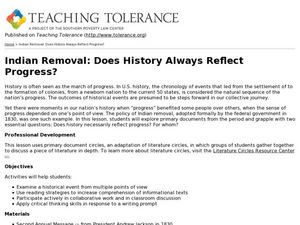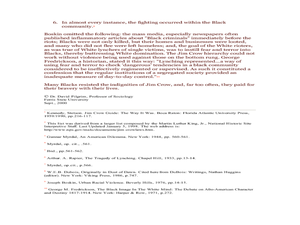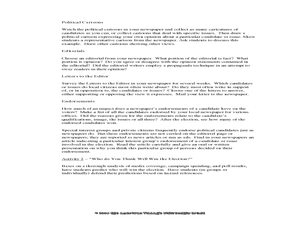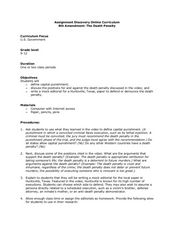Curated OER
Through the Eyes of Al McIntosh
Students examine World War II through the eyes of local journalists such as Al McIntosh. As a class, they discuss how stories about the war affects the public back at home. In groups, they compare and contrast how newspapers reported...
Curated OER
Indian Removal: Does History Always Reflect progress?
Students explore the idea that progress for some might not mean progress for all. In this Native American lesson, students recognize different viewpoints about historical events through the study of primary documents. Students decipher...
Curated OER
The Rise and Fall of the Jim Crow Era
High schoolers explore African American history by researching the Jim Crow laws. In this Civil Rights instructional activity, students define the Jim Crow laws, the reasons they were put into place, and how they were ultimately...
Curated OER
The Civil War: On the Homefront
Eighth graders examine the role of Indiana soldiers in the Civil War. In this American Civil War lesson, 8th graders listen to a lecture about the involvement of Indiana soldiers in the war and then analyze letters written home by the...
Curated OER
Investigative Journalism
Students choose newsworthy topics to research and investigate, narrow focus of investigation, get information from the source through interviews, write stories, and submit to media outlets.
Curated OER
Teaching Ethical Situations
Learners use journalism ethics standards to learn how to write ethically correct news stories. In this journalism and ethics lesson, young scholars review journalism standards for ethics. Learners use the standards as they analyze...
Curated OER
Bioethics: Where the Future May Take Us
Middle schoolers investigate bioethical issues. In this bioethical issues instructional activity, students research gene cloning, imaging technologies, transplantation, and other bioethical issues. Middle schoolers share their finding...
Curated OER
A Tongue-Twisting Language Arts Lesson
Learners discover enunciation and alliteration by reading tongue twisters in class. In this language arts instructional activity, students listen and repeat some of the classic childhood tongue twisters along with their teacher....
Curated OER
Research Paper
An outline for a research paper assignment lists the expectations, grading rubric, and due dates for an extended research writing project.
Curated OER
Against the Odds
What factors help people achieve goals? What factors prevent people from achieving goals? What are the elements that need to be in place to make a team function well? Using Damien Lewis’ Desert Claw and John Francome’s Winner Takes All,...
Pearson
Past Time
How do you talk about things that have already happened? What about things that happened in the past and are still happening? Explore past, past perfect, and past progressive verb tenses in a helpful slideshow presentation.
National Endowment for the Humanities
A Defense of the Electoral College
Each presidential election year, the debate about the electoral college rages. Michael C. Maibach's "A Defense of the Electoral College" offers young political scientists an opportunity to examine a reasoned argument for why the...
Curated OER
The Red Kangaroo: An Outback Survivor
Students watch an episode of "Nature" about the "Big Red Roos." They create food chains and webs based on the information they've researched on the red kangaroos. They write an editorial on the topic of the killing of kangaroos in the...
Curated OER
Read All About It!
Young scholars research and develop a newspaper based on the day they were born. In this newspaper lesson plan, students write an editorial, look for a political cartoon, draw a visual and find music from that year. ...
Curated OER
Language Arts: The Three Appeals
Young scholars are able to identify and describe the persuasive techniques used in editorial writing. They are able to label persuasive techniques with the logos, pathos, and ethos terminology.
Curated OER
Susan B. Anthony & Women's Suffrage
Learners explore the life of Susan B. Anthony and Victorian views on women's suffrage. After discussing the suffrage movement, groups of students observe lithographs and discuss reasons for Miss Anthony's arrest. They read a petition...
Curated OER
Attack on Hiroshima and Nagasaki
Sixth graders hear a story about the atomic bombing of Japan and write an editorial about the event from the perspective of either a Japanese or an American.
Curated OER
The Campaign: Issues and Strategies. What do you think?
Students research a candidate in an election and discuss how the media portrays that candidate and how the media influences voters. In this candidate lesson plan, students also distinguish fact from opinion, look at political cartoons,...
Curated OER
Speak Out!
Students consider their opinions on various topics and issues related to the terrorist attacks on the United States on September 11, 2001. Then, focusing on one specific topic, each student supports his or her opinions in a...
Curated OER
What's My Point?
Sixth graders move through the process of defining persuasion, identifying persuasive arguments and techniques in writing and evaluating their own use of accurate details. Students also define an author's point of view.
Curated OER
The Bill of Rights Is in the News!
Students determine currency of the Bill of Rights by locating current newspaper articles or editorials that support or refute each of the 1st Ten Amendments.
Curated OER
Separate But Equal Video
Eighth graders watch the video "Separate But Equal." They choose an incident or event from the video that is interesting or meaningful to them and write an objective news article and an editorial.
Curated OER
Why Was the United States Filled With Self-Doubt at the End of the Carter Administration?
Students research the events of the 1960s and 1970s using the internet. In groups, they draw their own political cartoons about one of the events. They also write a summary about how one specific event of their choosing gave the United...
Curated OER
8th Amendment: The Death Penalty
Young scholars explore capital punishment. In this death penalty lesson, students research capital punishment and write an editorial defending 1 side of the issue.

























